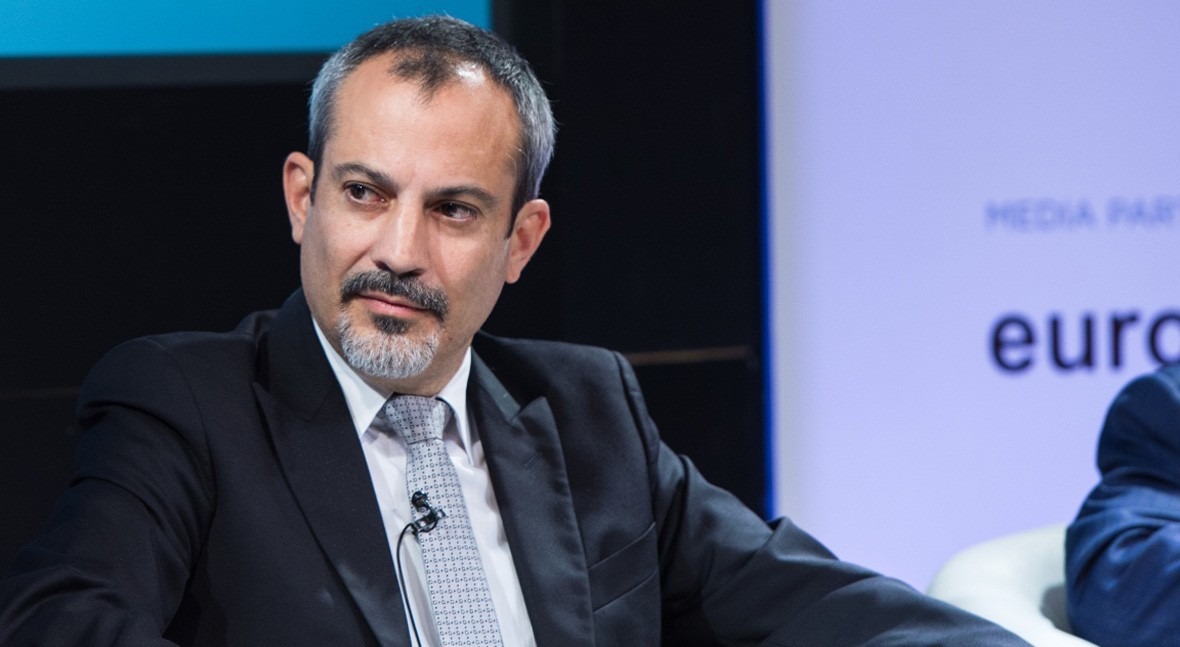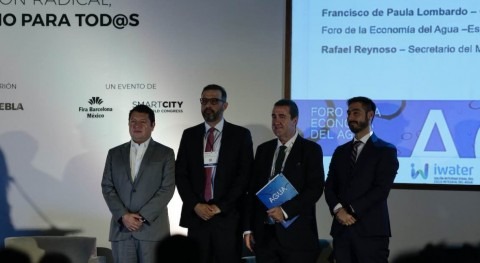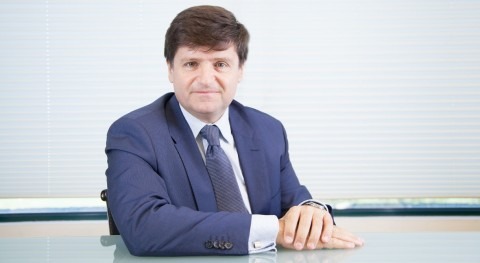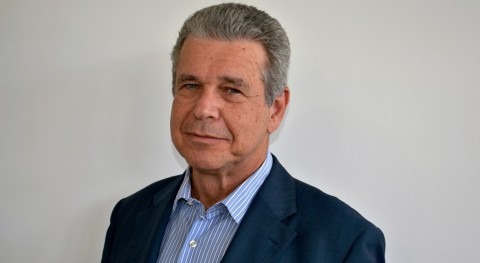Víctor Arroyo, Director, IFI (International Financing Institutions) and Strategic Markets, Isle Utilities, was one of the speakers at the 11th Water Economy Forum held on July 2nd in Puebla, Mexico, where he took part in the fourth session about the technology revolution in the water sector.
Mr Arroyo graduated in chemical engineering from the Complutense University of Madrid and has an MBA focusing on the infrastructure sector from the EOI Business School in Madrid. At the Isle Group, Victor Arroyo leads business development efforts in Latin America and strategic relations with International Financing Institutions. He has 25 years of experience in the water sector, working in business development and project management in Europe, Africa and Latin America. His professional experience has focused on the identification and management of projects dealing with water resources, irrigation, water and sanitation, capacity building in water companies and services in suburban and rural areas of Africa and Latin America. He has extensive experience in technical and commercial optimization of water supply services.
Mr Arroyo is an expert with extensive experience in the project management cycle of international organisations, from identification and feasibility studies to monitoring, strategy development and knowledge management. He has led the Water and Sanitation sector for the Latin American region in international organisations (UN Habitat and CAF), representing those institutions before senior officials of national governments, clients and partners, coordinating the technical sector dialogue. He has been a member of the World Water Council Board of Governors, the Scientific Committee of the Stockholm World Water Week and the Water and Development Congress of the International Water Association.
'Keeping abreast of the new technology developments is no easy task for water services management companies in Latin America'
Question: What is the role of innovation and new technologies in efficient water management in the Latin American region?
Answer: Even though the impacts of climate change, such as droughts and floods, environmental stress and population growth combine to increase the pressure on public water services, the role of innovation and new technologies is just beginning in the Latin American region.
However, reality is stubborn and the vision of a future smart company requires using a combination of new approaches and new technologies to address these new challenges. Nowadays it is more crucial than ever for investments to take advantage of the benefits new technologies can provide, to maximise the impact in the short and long term.
Worth noting are the efforts of some international organisations such as the Inter-American Development Bank and the Development Bank of Latin America (CAF) to support innovation in the sector. The role of these organisations is key in a sector where the appropriate incentives for innovation are not in place yet, as in other regions, where they take the form of tariff design and/or technical regulations.
Q: What innovation trends do you believe are more important for water management?
A: Key innovation opportunities for water services management companies encompass the entire water cycle, and we can group them into three main themes.
The first component would be water supply security. Emerging technology in this area allows smarter management of water reserves in basins and helps improve resilience, for example, through the use of data gathered from multiple sources such as sensors, cameras, radars and satellites. These data can be used to picture potential sources of pollution in a catchment area, and enable proactive measures to improve water quality before it reaches the treatment plant. However, even with this intervention, treatment will always be necessary to provide high quality potable water; in this regard the existing types of technologies are also important to remove difficult and/or emerging pollutants, to treat saline water and to control water quality.
The second theme would be how a smart company can ensure effective waste water management. In general, waste water management requires significant funds in order to stay up to date in many regions of the world. However, the positive aspect is that waste water treatment technology have advanced to a great extent in the past few years, and in some cases the investment needs and the operating costs are significantly reduced. Nevertheless, the biggest change in centralised sewerage systems is recognising the energy and nutrient content in waste water flows, that enable waste water treatment plants to become energy and fertiliser producing plants. In regions with a fast growing population and no inherited sewerage systems, the model is changing towards a decentralised one, with in situ or very small treatment sites.
The third theme would be how can companies benefit from digital technology, which is one of the biggest opportunities in the short and medium term. The proliferation of digital tools such as progress with regard to sensors, software, blockchain and artificial intelligence provides water companies a range of methods to better manage their services and increase efficiency. From the most common telemetry systems that allow remote management to sophisticated analyses of pressure data to identify potential leaks, the possibilities are potentially endless.

Q: How can the private sector contribute to addressing the main water challenges in Latin America?
A: Keeping abreast of the new technology developments is no easy task for water services management companies in Latin America. The amount of new technologies is huge, and understanding the potential impacts and risks of implementing them may seem daunting; as a result, companies depend on traditional technologies which have been used for a long time. Even if a technology or process is known to have some shortcomings, it is selected just because it is better understood. Therefore, although new technology offers potential benefits, the whole sector has to collaborate and share best practices to increase the likelihood of implementation.
In general, most companies have tried technologies to solve a specific problem which is critical for them. From that point on, some companies have become industry leaders and their goal has been to turn a threat into a strength.
The exchange of experiences between public and private companies and collaboration to develop technologies is a key element to ensure greater adoption of technologies in the sector. Only with a more dynamic sector that innovates, develops and finally adopts technologies will the appropriate market develop; ultimately the market would be a driver to achieve a technology development potential to make water and sanitation services management more efficient.
'The exchange of experiences between public and private companies and collaboration to develop technologies is a key element to ensure greater adoption of technologies in the sector'
Q: To this effect, can you tell us about the projects of Isle Utilities in Latin America?
A: Isle is a global and independent consultancy, with a solid background in identifying and supporting acceleration to adopt technology and innovative solutions in the water sector. It acts as a facilitator between technology developers and final users (industry, municipalities, utilities, companies and water cycle management authorities) and/or investors.
It has technical experience in the identification of technologies to support water cycle management, including water resource management, efficient network management, leak reduction, desalination, drinking water and waste water treatment, reuse, sludge management (including the generation of energy in the treatment process: anaerobic digestion, gasification, pyrolysis, etc.), flood and drought control and other environmental sectors.
Isle has recently taken its first steps in Latin America. In 2013 Isle implemented its collaborative innovation forum model (Technology Approval Group -TAG) in Brazil, with the participation of the main water companies in the country; currently it organises innovation workshops to optimise water distribution networks and reduce leaks for some companies.
We are also implementing a project in Chile and making efforts in Mexico, Colombia, Ecuador and Costa Rica, where our first contacts suggest important opportunities.
'The provision of water services is at a demanding but exciting moment'
Q: How did you get involved with the Water Economy Forum?
A: I became involved with the Water Economy Forum when I was working at the CAF as Director of Knowledge Management in Water; we collaborated in several occasions.
Q: ¿What did you want to transmit at the XI Water Economy Forum?
A: The provision of water services is at a demanding but exciting moment, because traditional approaches are being questioned as new technologies mature. The challenge is for public water services to develop the capacity of staff, because technology implementation and operation depends on qualified operators.
Effective collaboration, both internally and with external partners and clients, will have a crucial role. Water companies must harness innovation from internal and external sources, assess the most promising ones according to their business needs and develop and create prototypes to be implemented as effective solutions. Collaboration between companies and dissemination of the best technological solutions will ensure the resilience of companies against future challenges.









